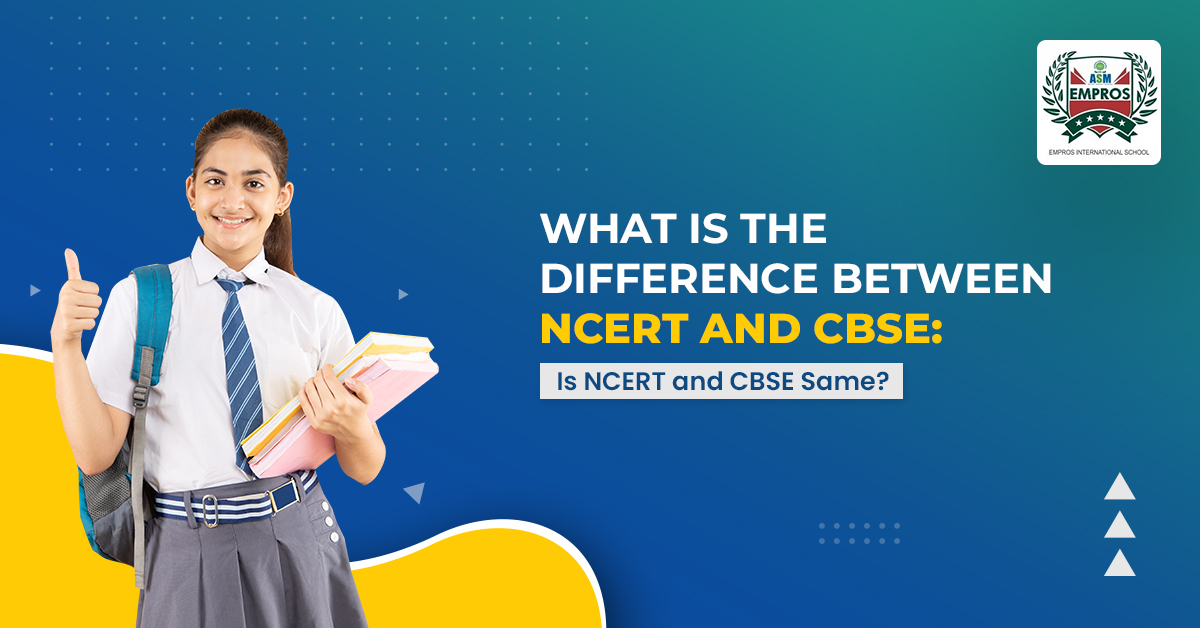When it comes to education in India, two terms that often pop up are NCERT and CBSE. These names are frequently mentioned in discussions about textbooks, syllabi, and examinations, leading to confusion about whether they refer to the same thing. While NCERT and CBSE are closely related, they serve distinct purposes within the Indian education system.
Understanding the differences between NCERT and CBSE is essential for students, parents, and educators alike. In this blog, we’ll break down what each entity is, their roles, how they work together, and the key differences between them.
What is NCERT?
NCERT, or the National Council of Educational Research and Training, is an autonomous organization under the Ministry of Education, Government of India. Established in 1961, NCERT’s main objective is to improve the quality of school education in the country. It does so by developing and publishing educational materials, conducting research, and providing educational resources to students, teachers, and policymakers.
Role of NCERT
The role of NCERT extends beyond simply creating textbooks. It plays a crucial part in shaping the educational landscape of India. Here are some key roles of NCERT:
- Development of Curriculum: NCERT is responsible for developing a national curriculum framework that sets educational standards for schools.
- Creation of Textbooks: NCERT publishes textbooks for various subjects, followed by schools affiliated with CBSE and other boards.
- Teacher Training: NCERT offers teacher training programs to improve teaching practices across the country.
- Educational Research: The organization conducts research to innovate and enhance the education system.
- Policy Development: NCERT contributes to policy-making in education, advising the government on various educational reforms.
- Student Resources: It provides learning resources, such as books, e-learning materials, and supplementary guides for students.
What is CBSE?
CBSE, or the Central Board of Secondary Education, is a national-level board of education governed by the Union Government of India. It is responsible for regulating and managing schools across the country and setting guidelines for academic performance. Established in 1962, CBSE is one of the most popular boards of education in India, with thousands of schools under its affiliation.
Role of CBSE
CBSE’s role is primarily administrative, but it directly impacts students’ learning experiences through its policies and examinations. Some of the key roles of CBSE are:
- Affiliation of Schools: CBSE affiliates schools across India and abroad, ensuring that they follow its set guidelines and curriculum.
- Syllabus Design: It designs the curriculum for grades 9 to 12, with a strong influence from NCERT textbooks.
- Examinations: CBSE conducts board examinations for 10th and 12th grades, which serve as crucial milestones in a student’s academic career.
- Teacher Assessment: CBSE develops criteria for the assessment of teachers and ensures that schools follow these guidelines.
- Conduct of Competitive Exams: CBSE organizes various national-level exams like JEE (Joint Entrance Examination) for engineering aspirants.
- Standardization of Education: The board ensures a standardized level of education across its affiliated schools, maintaining consistency in educational delivery.
Related Blog: CBSE Board: Full form, Syllabus, Benefits, Schools in India
Is NCERT and CBSE the Same?
The question of whether NCERT and CBSE are the same is one that often causes confusion. The short answer is no; they are not the same. However, they are closely connected and work in tandem to serve the Indian education system.
NCERT is primarily concerned with developing educational resources, such as textbooks and teaching materials, while CBSE is an educational board responsible for conducting exams and managing affiliated schools. In simpler terms, NCERT creates the content, and CBSE implements it.
For example, CBSE uses NCERT textbooks as the foundation for its curriculum. However, CBSE is free to make changes to the syllabus, incorporate additional subjects, or modify content as needed. Therefore, while they share a close relationship, they have distinct functions within the broader education system.
Key Differences Between NCERT and CBSE
Though NCERT and CBSE are often mentioned together, their functions are quite different. Below are some key differences between NCERT and CBSE:
Function:
- NCERT: Primarily develops textbooks, conducts research, and offers educational resources.
- CBSE: Affiliates schools, designs the syllabus, and conducts board exams.
Governance:
- NCERT: Operates as an autonomous organization under the Ministry of Education.
- CBSE: Is a national-level board of education governed by the Union Government.
Syllabus Creation:
- NCERT: Focuses on developing textbooks and educational frameworks.
- CBSE: Uses NCERT textbooks but has the authority to modify the syllabus as per its guidelines.
Primary Focus:
- NCERT: Research, innovation, and resource development in education.
- CBSE: Administration and management of school-level education and examinations.
NCERT Textbooks and CBSE Curriculum: How Do They Work Together?
One of the most frequent questions asked is how NCERT textbooks and the CBSE curriculum relate to one another. The connection is straightforward: CBSE prescribes NCERT textbooks for its affiliated schools as part of its curriculum. This means that students in CBSE schools follow the content published by NCERT.
While NCERT provides a standardized set of educational materials, CBSE ensures these materials are followed by all affiliated schools. Additionally, CBSE sets guidelines for the examinations, which are closely aligned with the content in NCERT textbooks.
Significance of NCERT & CBSE
Both NCERT and CBSE play pivotal roles in the Indian education system, but their significance extends beyond their basic functions.
Significance of NCERT
- Standardization: NCERT ensures that students across the country receive a uniform quality of education.
- Competitive Exams: NCERT books are highly recommended for preparing for national-level competitive exams like JEE, NEET, and UPSC.
- Inclusive Content: The organization strives to make textbooks that cater to diverse learning needs, promoting inclusivity in education.
- Research and Innovation: NCERT’s research-driven approach helps in improving teaching methods and learning outcomes.
- Affordable Learning: NCERT books are available at affordable prices, making quality education accessible to all.
Significance of CBSE
- Nationwide Reach: CBSE-affiliated schools are spread across India and abroad, providing students with a standardized education.
- Global Recognition: CBSE qualifications are widely recognized both in India and internationally.
- Preparation for Higher Education: CBSE’s curriculum is designed to prepare students for university education and competitive exams.
- Holistic Development: CBSE places emphasis on co-curricular activities alongside academics, ensuring the holistic development of students.
- Inclusive Assessment: The board ensures that schools follow fair and transparent assessment methods to evaluate students’ academic progress.
Is it Compulsory to Recommend NCERT Books in CBSE Board Schools?
Yes, CBSE recommends NCERT books for schools under its affiliation. While schools have some flexibility in adding supplementary materials, NCERT textbooks form the core of the curriculum. This recommendation ensures a uniform academic standard across all CBSE-affiliated schools. NCERT books are designed to cover essential concepts and topics that students need to excel in their board exams and competitive exams.
BrainPulses :
BrainPulses offers a gamified learning experience through the world’s best AI-integrated quizzing app, igniting curiosity, assessing wisdom, expanding knowledge, and building expertise to keep employees engaged and empowered.
FAQs about the Difference Between NCERT and CBSE
Q1. Which boards use NCERT?
NCERT textbooks are not limited to CBSE-affiliated schools. Many state boards also follow NCERT textbooks due to their standardized and comprehensive content.
Q2. Is NCERT based on CBSE?
No, NCERT is not based on CBSE. NCERT is an autonomous body that creates educational materials, while CBSE uses NCERT books as part of its curriculum.
Q3. Which exams are based on NCERT books?
Many national-level competitive exams like JEE, NEET, and UPSC are based on NCERT books. These exams often draw questions from NCERT textbooks, especially in subjects like science and social studies.
Q4. Is the syllabus of NCERT and CBSE the same?
While CBSE uses NCERT books as a foundation for its syllabus, the two are not exactly the same. CBSE may make modifications or additions to the NCERT syllabus to suit its needs.
Q5. Does CBSE give questions from NCERT?
Yes, most questions in CBSE board exams are based on the concepts and content covered in NCERT textbooks. This is why NCERT books are considered essential for CBSE exam preparation.
Conclusion
In summary, while NCERT and CBSE are closely related, they serve different roles in the Indian education system. NCERT focuses on developing educational materials, while CBSE is an examination board responsible for governing schools and conducting exams. Together, they ensure that students across India receive quality education that prepares them for higher studies and competitive exams.
Shape Your Future with ASM Empros: Your Premier CBSE School
At ASM Empros International School, we believe in providing students with a strong foundation in the CBSE curriculum, powered by NCERT’s comprehensive textbooks. With expert educators and a holistic learning environment, ASM Empros helps students excel academically while nurturing their overall development. Join us to shape your future through world-class CBSE education!

